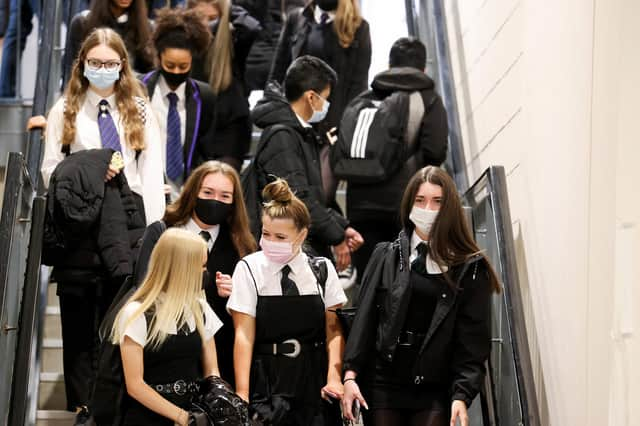Schools must close again if we are to beat this virus - Euan McColm


Traditionally, this cost has been measured in depleted bank balances and soaring credit card bills but, as we creep uneasily into 2021, the price we paid for the festivities of little more than a week ago will be of a different nature.
As coronavirus rates soar, the loosening of defences for December 25 starts to look less like an act of compassion on the part of governments and more like utter recklessness.
Advertisement
Hide AdAdvertisement
Hide AdYes, we can all understand why the Prime and First Ministers were keen to allow families a little leeway after a year of lockdowns and bans on meeting up with others but, as hospitals continue to fill with those infected with Covid-19, might it not have been preferable for them to have maintained the toughest possible restrictions?
On Thursday, Scotland recorded 2,622 new Covid cases. This was a record high for the third day in a row.
And, as more people become symptomatic – remember it can take up to a week for infection to become apparent – those records stand to be broken in the days to come.
Despite the terrifying rate of infection and fears that a new, more swiftly transmissable strain of the virus is now dominant, we seem not to be taking the situation as seriously as we might.
Back in March, when the UK government and the devolved administrations announced the need for measures to help curtail the spread of the virus, their action was swift and decisive. We had no choice but to adapt to life under lockdown, with schools closed and all but essential shops forced to pull down their shutters. These measures, we were told, were difficult but necessary and if we lived by the rules, we’d get through the pandemic.
Most of us were willing to make the sacrifices demanded of us. Sure, there were the anti-mask cranks and the wild-eyed conspiracists who reckoned, variously, that the virus didn’t exist or that it did exist but had been created by this or that Establishment figure as a way of “controlling” the population, but most of us saw the value in following medical advice to restrict our movement.
Now? Well, we seem to have forgotten why we had to change the way we lived. Schools will open this week for the children of essential workers and the plan at the time of writing is that, by January 18, all kids are expected to be back in class.
Measures deemed necessary nine months ago are no longer required, even though the spike in infections is considerably worse than it was back then.
Advertisement
Hide AdAdvertisement
Hide AdThis makes no sense to me. If it is considered unsafe for accountants or lawyers to go to their offices to work – and the advice remains that anyone who can work at home should do so – why should teachers be expected to run the risk that mixing with dozens of children each day creates?
There continues to exist a tension between politicians and clinicians over the best response to the pandemic. Broadly speaking, medics, because their focus is entirely on the suppression of the virus, would prefer that we lived under the strictest possible restrictions while politicians, who face pressure from business and lobbying groups, want to strike a balance that keeps everyone happy.
The political case for the toughest measures is undermined by confused messaging and frequent U-turns. High-profile cases such as that of former Downing Street adviser Dominic Cummings, whose lockdown-breaking jaunt from London to County Durham was not judged worthy of reprimand by Boris Johnson, only weaken public resolve to do what is necessary. If he can break the rules and get away with it, why shouldn’t the rest of us?
Of course the news is not all bad. The fact that increasing numbers of us are being vaccinated is a real cause for optimism. But that light is flickering at the end of a very long tunnel. Even as more of us get the jab, mutations of the virus will continue to wreak devastation.
So surely it’s time for governments around the UK to do more to refocus minds? Yes, it might be inconvenient to keep schools closed but is that inconvenience not worth it if it removes the risk of transmission from classrooms to the wider community? Are we really taking the necessary measures to curtail the spread of coronavirus if we’re keeping schools open?
And while governments should be thinking again about the situation in schools, I’d argue they should also be reconsidering restrictions in shops. Back in spring, we had to wait – at a distance of two metres from each other – outside supermarkets so that the numbers inside could be controlled. This did two things. First, it ensured safer shopping and, second, it made us think more broadly about the risks presented by coronavirus. Nobody could have been in any doubt, as they waited outside Tesco, that things were getting dangerous.
Now, we may, so long as we wear our masks, breeze into shops, mixing in the sort of crowds we are told we must avoid.
As coronavirus infection rates rocket, it’s time for draconian measures. Schools should not reopen next week and the tough restrictions that we faced last spring must return. We’re kidding ourselves if we think the situation in which we find ourselves will swiftly improve without further sacrifices.
Comments
Want to join the conversation? Please or to comment on this article.